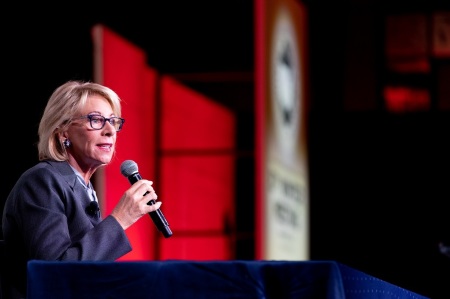DeVos expands experimental college prison program backed by evangelical ministry

Education Secretary Betsy DeVos has doubled the size of an experimental program praised by the nation’s largest evangelical prison ministry designed to make it easier for inmates to access college courses and degree programs to help prepare them for life after their release.
The Education Department announced Friday that it has selected 67 new higher education institutions to join its Second Chance Pell Experimental Site Initiative. The new participants include at least 11 Christian and Catholic nonprofit private institutions.
The expansion allows incarcerated students to use federal Pell Grants (awarded to low-income students to pay for post-secondary education) at over 130 schools in 42 states and the District of Columbia.
"I've had the pleasure of visiting several Second Chance Pell institutions and have seen firsthand the transformative impact this experiment has on the lives of individuals who are incarcerated," DeVos said in a statement.
"By expanding this experiment, we are providing a meaningful opportunity for more students to set themselves up for future success in the workforce. The stories I've heard from students and institutions engaged in the experiment are very encouraging, and we look forward to seeing how this expansion will help even more students achieve a better future."
The temporary initiative was created in 2015 by the Obama administration in which 63 schools from 23 states were initially selected to participate in the program, 13 of which were colleges affiliated with the Council for Christian Colleges and Universities.
So far, the program has helped bring college programs to about 12,000 incarcerated individuals across the U.S. In the past three years, over 4,000 credentials, including post-secondary certificates, associate degrees and bachelor's degrees. have been awarded to Second Chance Pell students.
“Pell Grant access offers people in prison the opportunity to develop new skills and practice living as good citizens inside and outside of prison,” James Ackerman, president of the evangelical prison ministry Prison Fellowship, said in a statement.
“Secretary DeVos’ action expanding Second Chance Pell sites will solidify her legacy as a leader who stands up for the dignity and potential of ‘the least of these’ and fosters safer communities.”
The Education Department received over 180 letters of interest from colleges and universities after it announced last May that it would extend the Second Chance Pell program and reopen the application process. The schools chosen to join the program were “determined to be the most qualified.”
The Education Department believes the addition of the new institutions will ensure “institutional, programmatic, and geographic diversity among new participants.” Almost two-thirds of the schools added to the experiment are two-year institutions, while one-third are institutions that are “minority-serving.”
Eight of the newly accepted institutions will “deliver instruction through innovative and distance delivery methods” while 18 other schools have proposed hybrid models of instruction.
The program uses the authority of the Experimental Sites Initiative granted under the Higher Education Act to circumvent a 1994 crime law banning inmates from receiving Pell Grants.
Prior to the 1994 law, advocates say, there were hundreds of partnerships between prisons and higher education institutions.
Criminal justice activists and Christian groups have supported bills aimed at removing the 1994 ban in order to make the Second Chance Pell more permanent and not reliant on an Education Department experimental program.
A bipartisan bill that was introduced in Congress last year has not received much momentum. Among many advocacy groups, the bill is backed by Prison Fellowship, the National District Attorneys Association, the U.S. Chamber of Commerce and a nonprofit that mentors currently and formerly incarcerated individuals called From Prison Cells to PhD.
“Lawmakers should take a page from the secretary’s playbook and move the ball down the field,” said Prison Fellowship Vice President of Government Affairs and Church Mobilization Heather Rice-Minus. “Before the end of the calendar year, we hope to see Congress finally take action to make Pell Grants available to men and women who are serving their time and working toward a second chance.”
Proponents contend that expanding access to Pell Grants will help reduce the country’s recidivism rate over time as inmates will have increased access to vocational courses and other degree programs.
According to a study by the RAND Corporation, inmates who participate in correctional education programs had 43 percent lower odds of recidivating than inmates who did not.
A January 2019 report from the Vera Institute of Justice estimates that over 463,000 incarcerated individuals would be eligible to receive Pell Grants if the ban on Pell Grants for inmates is lifted.
The institute also reported that data from 2014 suggests that only 9 percent of incarcerated people received a certificate from a college or trade school while in prison.





















